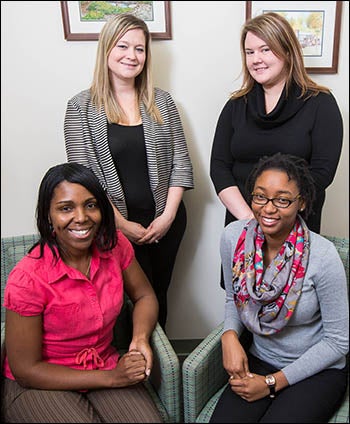MAKING A RECOVERY
ECU, Vidant care for pregnant women, new moms with history of drug use
East Carolina University and Vidant Medical Center have teamed up to help pregnant women and new mothers with a history of substance abuse across eastern North Carolina.
The Pregnancy and Recovery Clinic or PARC is an arm of ECU’s Navigate clinic, operated by the ECU Department of Addictions and Rehabilitation Studies in the College of Allied Health Sciences.

Working together to help new mothers and pregnant women manage their recovery through the PARC program are PARC coordinator Alicia Bell, standing at left, and ECU master’s students Gwen Gilbert, seated left, Qu’Nesha Hinton, seated right, and Erin Swanson, standing right.
ECU staff and master’s students provide group counseling and collaborate with nurses at Vidant Medical Center who provide prenatal and perinatal education on topics from breastfeeding to babies in withdrawal, said Alicia Bell, coordinator of PARC and a doctoral student in addictions and rehabilitation studies.
Participants must be pregnant or up to one year postpartum. Services are open to any woman with a history of substance abuse – not just first-time mothers – and are provided on a sliding fee scale. Individual counseling is also available to women who prefer it over group counseling.
“We are hoping to reach 100 women by the spring, roll out the program to various counties in the east, and build our outpatient group,” Bell said.
Early this year, organizers will tour a similar established program at the University of North Carolina at Chapel Hill to learn what works there and what could be duplicated in eastern North Carolina.
“We will also be taking on more student interns. PARC has proven to be a great place for counselors in training to learn. We have also had a lot of nursing students sit in on our assessments and groups, so hopefully they will learn motivational interviewing skills to use with patients in the health care field,” Bell said.
Motivational interviewing is a style of counseling that aims to bolster a person’s own commitment and motivation to change.
Teaching the basics
PARC has partnered with the Walter B. Jones Alcohol and Drug Abuse Treatment Center to provide counseling services and perinatal education on site, which is supported through a Transitions of Hope grant from the March of Dimes written by Vidant Health’s perinatal outreach coordinator Kimberly Harper.
Clients come from diverse cultural and socioeconomic backgrounds with a history of addiction to prescription pain medications, cocaine, heroin, marijuana, alcohol or injectable drugs. Usage of methamphetamine or “crystal meth” and bath salts are also on the rise in rural areas, officials say.
Babies withdrawing from a dependence on drugs or alcohol often will have a high pitched cry, diarrhea, shakes or jitters, and the baby will likely have to spend more time in the hospital at birth.
It’s particularly important for women who have chosen recovery to remain in therapy after delivery, Bell said, because studies show that women often cut back or eliminate their use of drugs while pregnant but start using again six to eight weeks after delivery.
“We are facilitating change by looking at the positives and negatives,” Bell said. “Getting someone to look at their values and behaviors, looking at what stage of change they’re in. What are you willing to do? You’re meeting the client where they’re at.”
They also emphasize harm reduction. “If you’re using needles, will you use clean needles?”
Providing support
Some of the women who are in group therapy for the first time are developing support systems, getting to know each other better and advocating for each other, Bell said.
“It’s been amazing to see the change and to watch them grow as individuals and believe they can make it in the world,” said Qu’Nesha Hinton, one of three ECU rehabilitation master’s degree dedicated to the program. Hinton and classmates Gwen Gilbert and Erin Swanson have been essential to the program’s success, Bell said.
The PARC program fills a void because providers are sometimes hesitant to care for pregnant women or new mothers with a history of substance use because they don’t know the best protocol, Bell said.
“I really feel its integrative care,” she said. “The mental health side and the medical side are working together to provide care the women need.”
Officials also plan to create a “train the trainer” program to broaden PARC’s reach and sustain efforts.
To learn more about the program, email navigate@ecu.edu or call 252-744-0328. The department is also accepting donations of new baby items (diapers, wipes, etc.) for women in the program.